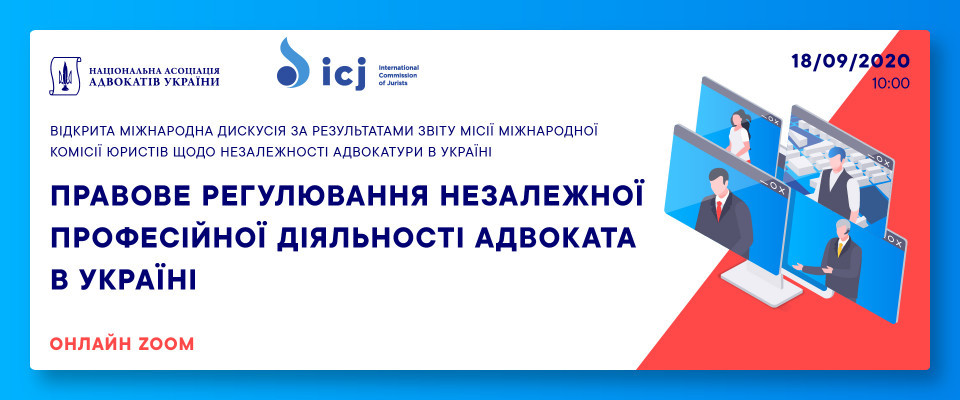
Sep 17, 2020 | Events, News
The ICJ in cooperation with the Ukraine National Bar Association will hold an online roundtable discussion “Security of lawyers and state of legal profession in Ukraine”.
The event of 18 September 2020 will assemble leading legal experts and practitioners from Ukraine and other countries who will discuss the state of the legal profession in Ukraine in light of the international standards on the role and independence of lawyers, and national legislation and practice. The discussion will center around the challenges to security of lawyers, especially where they protect human rights, as well as the institutional independence and self-governance of legal profession in Ukraine.
The round table follows an ICJ mission report, Between the Rock and the Anvil: Lawyers under Attack in Ukraine, that documents and analyses the state of the independence of the legal profession in Ukraine and risks that lawyers face in their work in defence of their clients.
The event is open for participation upon online registration. Please contact Leyla Madatli at Leyla.Madatli@icj.org.
The working languages of the event is Ukrainian, Russian and English. The roundtable will continue from 10.00 to 14.00 Ukraine time (CET 9.00-13.00).
Agenda in English.
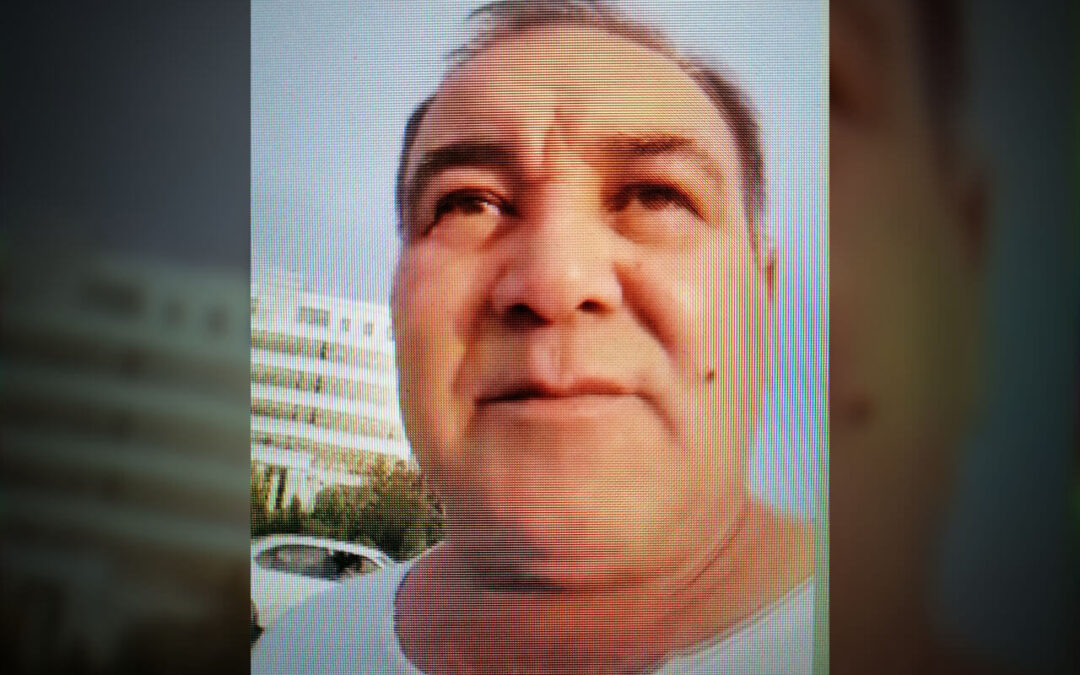
Sep 14, 2020 | News
Today, the ICJ called on Turkmenistan to comply with its international legal obligations to release detained lawyer Pygamberdy Allaberdyev, who is alleged to be arbitrarily detained, or to charge him with a cognizable crime consistent with international human rights law.
Allaberdyev, who has been denied access to his lawyer, should be provided access to the lawyer hired by his family and should have access to family members. He should be sufficiently informed about any charges against him which justify his arrest and should be provided with medication, food and other necessities which may be necessary to protect his right to life and health.
According to the Russian-based Memorial Human Rights Centre, on 5 September at about 7 pm, Pybamberdy Allaberdyev and another person were leaving a grocery store, when an unknown young man unexpectedly approached began a verbal skirmish, then grabbed Allaberdiev by the collar. Almost immediately, police officers appeared and the attacker pointed to the lawyer as the instigator of the conflict, after which he left. This conflict is believed to be staged as a justification to detain the lawyer.
Allaberdiev was taken to the police station, where the attacker came with a bandaged hand 20 minutes later. Soon after, Ministry of National Security officers from Ashgabat came to the police station, and accused Allaberdiyev of having links with activists of the Turkmenistan protest movement based abroad. He was interrogated without a lawyer and his house was searched. Family members have sought to provide him with needed medicine and food, but were said to have been prevented by the authorities from doing so.
On 8 September, the Prosecutor’s Office issued an arrest warrant against Allaberdyev. He is charged with crimes under Article 108 (intentional harm to health of moderate severity) and 279 (hooliganism) of the Criminal Code of Turkmenistan. Allberdyev never appeared before the court, as it is the Prosecutor’s Office which authorizes arrest warrants in Turkmenistan, a practice which is contrary to Article 9(3) of the International Covenant on Civil and Political Rights (ICCPR), to which Turkmenistan is a party.
The arrest of Pybamberdy Allaberdyev is suspected to be related to his alleged links or discussions with Turkmen activists living outside Turkmenistan who protested against upcoming constitutional amendments. The ICJ is concerned that these charges are arbitrary and in violation of his rights to freedom of association and freedom of expression, protected under the ICCPR, to which Turkmenistan is a party.
The ICJ recalls that, under the UN Basic Principles on the role of lawyers, “Lawyers like other citizens are entitled to freedom of expression, belief, association and assembly. In particular, they shall have the right to take part in public discussion of matters concerning the law, the administration of justice and the promotion and protection of human rights and to join or form local, national or international organizations and attend their meetings, without suffering professional restrictions by reason of their lawful action or their membership in a lawful organization” (Principle 23).
Under the ICCPR, Turkmenistan is also bound to respect the rights to liberty and to fair trial. Under Article 9(3) of the ICCPR, anyone arrested or detained on a criminal charge shall be brought promptly before a judge or other officer authorized by law to exercise judicial power and shall be entitled to trial within a reasonable time or to release. A Prosecutor, as representative for a party to the case, cannot be such an officer.
In this connection, the ICJ stresses that the right of access to qualified legal representation is crucial for the protection of the human rights of those arrested.
Background:
The Republic of Turkmenistan acceded to the International Covenant on Civil and Political Rights in 1997.
On 19 August 2020, the Constitutional Commission for the development and consolidation of proposals in connection with the introduction of amendments and additions to the Constitution of Turkmenistan completed work on draft amendments to the Constitution. Under the draft amendments, a bicameral parliament, the National Council, would be established, with Khalk Maslakhaty (People’s Council) and the Mejlis (Assembly) being its higher and lower chambers respectively. Under the new amendments, former Presidents of Turkmenistan acquire membership in Khalk Maslakhaty for life.
On 7 September 2020, the Moscow-based Memorial Human Rights Center and the Turkmen Helsinki Foundation issued a statement about the detention of Pygamberdy Allaberdyev, a lawyer at a State oil company, by the police.
On August 2020, a number of Turkmen activists based abroad organized protests against the constitutional amendments and the lack of response of the State to the COVID-19 pandemic in Turkmenistan.
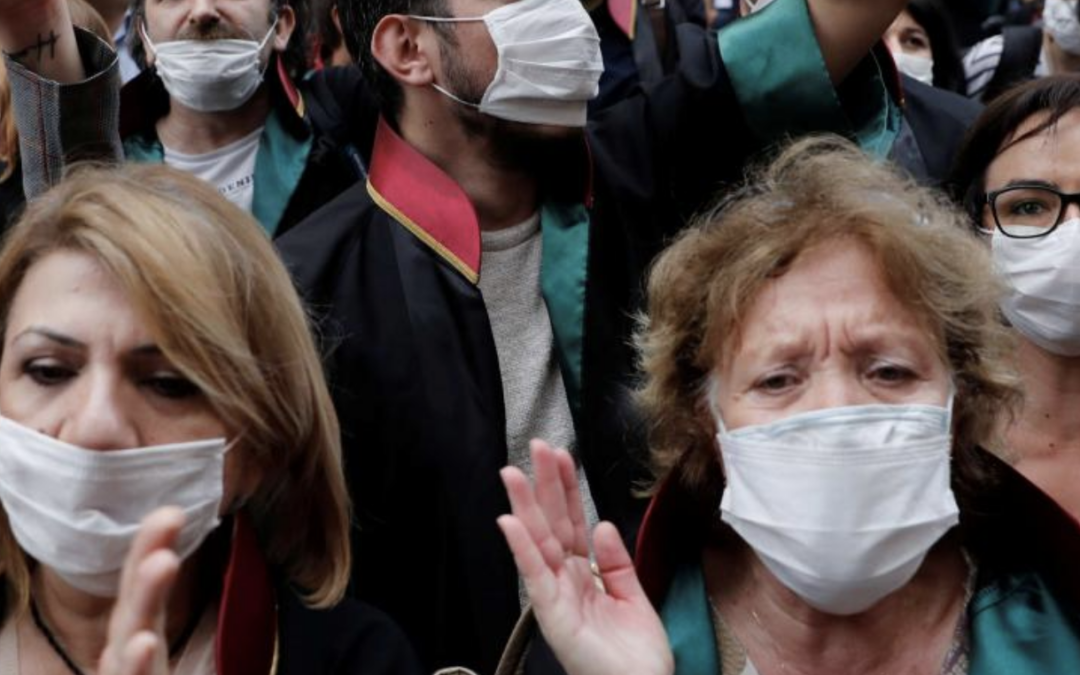
Sep 14, 2020 | News
The ICJ expressed today its deep concern at the arrest order of some 60 lawyers in Turkey on grounds allegedly linked to the representation of their clients, in breach of Turkey’s international law obligations.
The ICJ understands that around 47 lawyers have been arrested on 11 September in Turkey while 13 others are being searched by police for allegedly acting on behalf of clients accused of participation in the Gülenist movement, called by Turkish authorities the “Fetullahist Terrorist Organisation” (FETO). It has been reported that lawyers were interrogated about their professional activities.
“Lawyers should never be arrested or sanctioned for representing their clients, or identified with their clients causes,” said Roisin Pillay, Director of the ICJ Europe and Central Asia Programme,
“This is a basic principle of the independence of the legal profession and international law and its respect is essential to ensure that everyone has the right to a fair trial.”
The ICJ will follow the case closely to ensure that international law and standards are respected concerning any action against the lawyers arrested.
“If the sole charges against the lawyers arrested are related to their work as lawyers representing their clients, they should be immediately released,” added Roisin Pillay.
The ICJ stressed that they should not be subject to arrest for the legitimate exercise of any human rights and fundamental freedoms. In the event that any of them are subject to charges for cognizable crime consistent with Turkish and international law, they must be brought immediately before a court to consider whether any continued detention is lawful. If charged, they must be in ensured all rights of fair trial by independent and impartial courts.
The UN Basic Principles on the Role of Lawyers say that “lawyers shall not be identified with their clients or their clients’ causes as a result of discharging their functions” (article 18).
Contact:
Roisin Pillay, e: roisin.pillay(a)icj.org
Massimo Frigo, e: massimo.frigo(a)icj.org – t: +41797499949
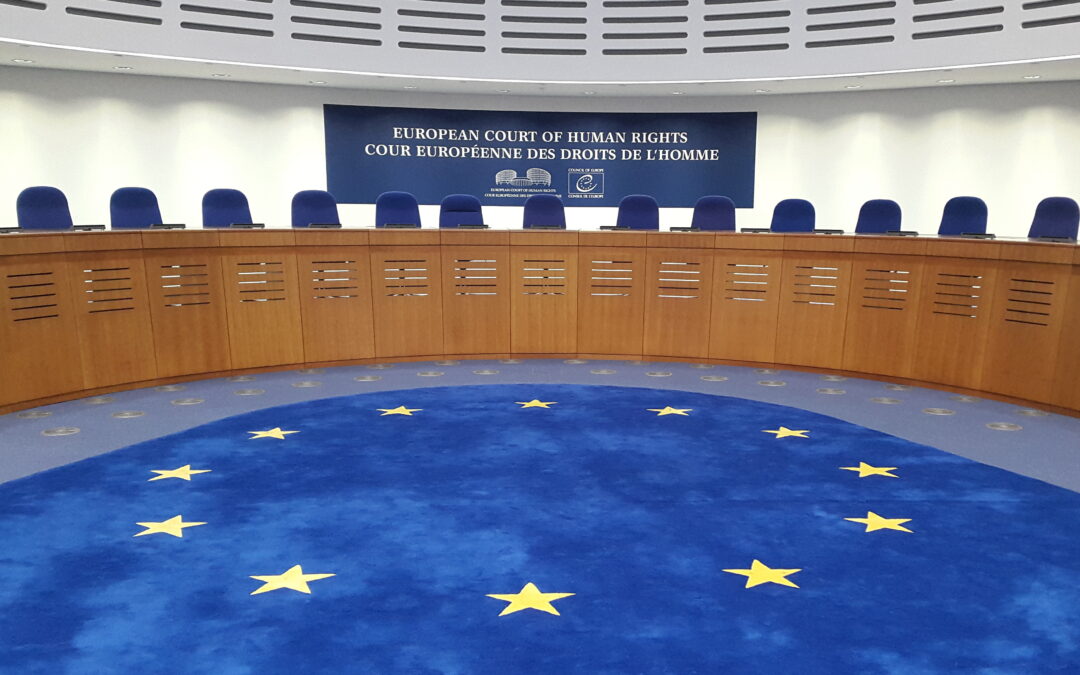
Sep 14, 2020 | Advocacy, Cases, Legal submissions
The ICJ and ECRE intervened today before the Grand Chamber of the European Court of Human Rights in the case of the extradition of a Kyrgyz national of Uzbek ethnicity back to his country of origin where he would be at risk of torture or other forms of ill-treatment .
In their submissions, the ICJ and the European Council on Refugees and Exiles (ECRE) analysed thenon-refoulement obligations of the Russian Federation under international human rights law in relation to the consideration of evidence to assess the substantial grounds to believe that a concerned person will face real risk of a serious human rights violation; and the use of diplomatic assurances purportedly to protect against torture and other serious human rights violations in light of international law.
The two NGOs also provided the Court with an update on the legal framework governing extraditions from the Russian Federation to Central Asian States, in particular Kyrgyzstan, as well as Russia’s extradition practice. They concluded that the analysis of the law and practice revealed a number of critical human rights deficits.
They submitted that the lack of respect for the procedural aspect of the principle of non-refoulement, the consequent ineffectiveness of domestic remedies in this regard, in the Russian Federation, and the abysmal record of Kyrgyzstan in upholding its obligation to respect and protect the prohibition of torture or other ill-treatment mean that extraditions from the Russian Federation to Kyrgyzstan entail a high risk of violations of both substantive and procedural aspects of the principle of non-refoulement.
These submissions are an update of the third party intervention submitted by the ICJ before the Chamber of the European Court of Human Rights on 22 September 2016. The Chamber had ruled that no risk of breach of the principle of non-refoulement existed in the case but the judgment is now subject to the review of the Grand Chamber.
ECtHR-TK and others v Russia-GC-ICJECRE-Final (download the third party intervention)
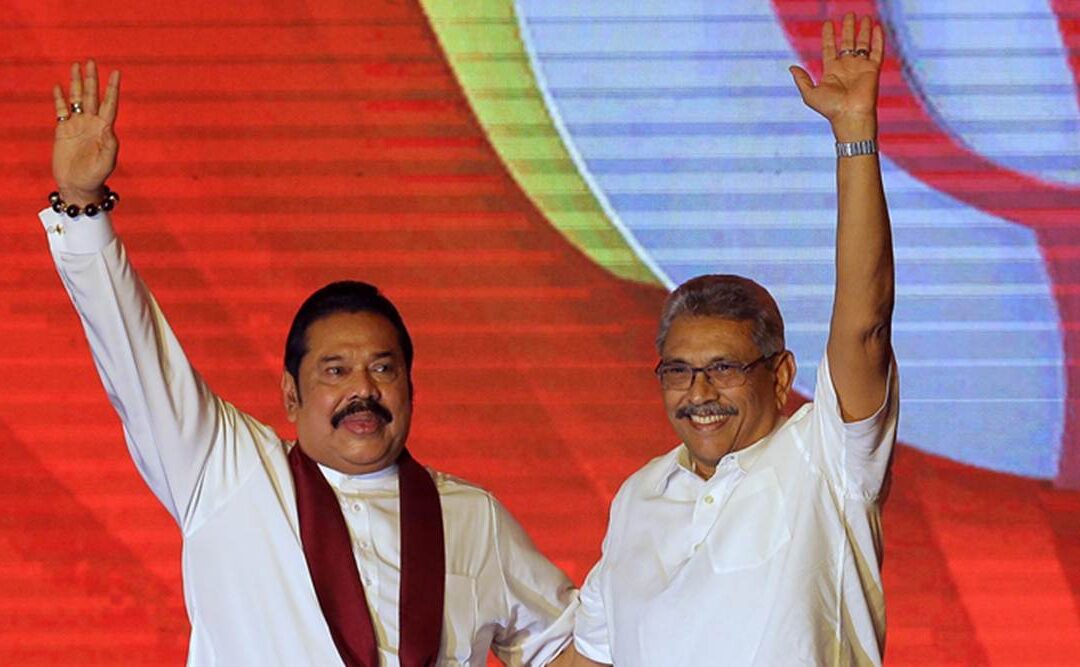
Sep 14, 2020 | News
The Sri Lankan parliament should reject the Sri Lankan Government’s efforts to amend the country’s constitution to provide unfettered powers to the President while encroaching on the powers of the legislature and infringing upon the independence of the judiciary, said the ICJ today.
“The proposed 20th Amendment, which bestows an already powerful executive president with additional powers with no effective checks on him, essentially placing him above the law,” said Sam Zarifi, ICJ’s Secretary General. “These amendments would tilt the balance of State power heavily on the side of the executive and in particular on a single person.”
The proposed 20th Amendment to the Constitution bill rolls back most of the reforms brought about by the 19th Amendment to the Constitution, the passage of which the UN Human Rights Council welcomed as “promoting democratic governance and oversight of key institutions”.
The 19th amendment, adopted in 2015, had imposed certain limits to the Executive President’s authority and powers, including in respect of terms of the office of President, the capacity to dissolve Parliament and to fast-track legislation. It also removed the blanket immunity the President enjoyed from legal proceedings. Critically, it had established a Constitutional Council which restrained the President’s discretion in appointing key governmental actors including in the judiciary, the Attorney General and the Inspector General of Police.
The ICJ notes that the 20th amendment appears to reproduce much of the regressive features of the old 18th amendment, which the 19th amendment had been brought about to correct.
“Sri Lanka’s Executive branch has a poor record of respecting human rights and the rule of law, and the 19th Amendment was an effort to impose the checks and balances necessary for the rule of law,” said Sam Zarifi. “The constitutional changes being proposed would take the country back to the dark days of Executive impunity.”
“We are particularly concerned that these changes would undermine the independence of the judiciary, as the President would have unfettered discretion to appoint the superior judiciary, including the Chief Justice, the President and Judges of the Court of the Appeal, and to control the Judicial Service Commission,” said Sam Zarifi.
The JSC is the body entrusted with the power to appoint, promote, transfer exercise disciplinary control and dismiss judicial officers of the subordinate courts. The changes would also grant the President the power to nominate members of the Judicial Service Commission (JSC) other than its Chairman which is ex officio, the Chief Justice.
The UN Basic Principles on the Independence of the Judiciary states that “Any method of judicial selection shall safeguard against judicial appointments for improper motives.”
Under international standards and recommendations of the UN Special Rapporteur on the Independence of the Judiciary, appointments to the judiciary should not be vested solely with the executive.
A judicial appointment process which gives the President full discretion would inevitably result in the significant erosion of the independence and impartiality of the Sri Lankan judiciary.
Moreover, several checks placed on the President’s powers by the 19th Amendment have also been removed while giving him greater legal immunity. The President would also be granted sole power to appoint the cabinet, assign to himself any cabinet portfolio and been given unfettered discretion in relation to the appointment and dismissal of the Prime Minister. The President would also retain the power to dissolve the Parliament within one year.
Contact
For questions and clarifications: Osama Motiwala, Communications Officer – osama.motiwala(a)icj.org









